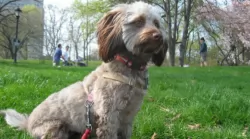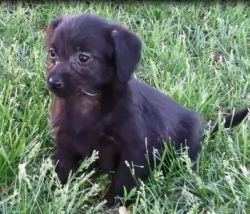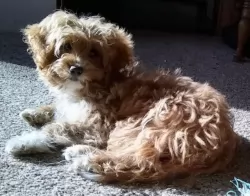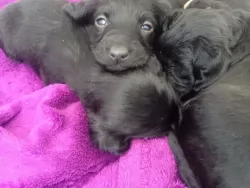 MyDogBreeds
MyDogBreeds Doxiepoo is originated from United States but Bichon Frise is originated from Spain. Both Doxiepoo and Bichon Frise are having almost same height. Both Doxiepoo and Bichon Frise are having almost same weight. Doxiepoo may live 4 years less than Bichon Frise. Both Doxiepoo and Bichon Frise has same litter size. Doxiepoo requires Moderate maintenance. But Bichon Frise requires Low maintenance
Doxiepoo is originated from United States but Bichon Frise is originated from Spain. Both Doxiepoo and Bichon Frise are having almost same height. Both Doxiepoo and Bichon Frise are having almost same weight. Doxiepoo may live 4 years less than Bichon Frise. Both Doxiepoo and Bichon Frise has same litter size. Doxiepoo requires Moderate maintenance. But Bichon Frise requires Low maintenance
 The Doxiepoo is a designer dog breed - a combination of the Dachshund who was used to hunt for Badgers and the Poodle, a dog bred in France to essentially be a lap dog. There is however some dispute as to whether the Poodle descends from Germany or from the French Barbet.
The Doxiepoo is a designer dog breed - a combination of the Dachshund who was used to hunt for Badgers and the Poodle, a dog bred in France to essentially be a lap dog. There is however some dispute as to whether the Poodle descends from Germany or from the French Barbet.
Wherever the parents hail from, the Doxiepoo hails from the United States of America.
With both the Poodle and the Dachshund being intelligent, fun and loving type of canines, the two of them together have brought out a wonderful hybrid pet in the Doxiepoo. Today, the Doxiepoo is bred with other Doxiepoos.
 Contrary to the myths and many of the tales of the history of the Bichon Frise, the breed was originally developed in Spain. Later specific trait development occurred in France to give us the lap dog Bichon Frise that we know today. The original Spanish dog – the Bichon – was a water – sailing dog. It was descended from the poodle breeds crossed with either the water spaniels or the Barbet. These early dogs were friendly and happy and because of this, sailors carried them with them on their ships and even bartered them for supplies. Prior to the 14th century the Spanish probably brought them to the Canary Islands. Later in the 14th century they we discovered again by Italian sailors who returned them to Europe where they lived in the courts of the nobility. During the Renaissance and after the French fell in love with the breed while the Spanish continue to enjoy their presence.
Contrary to the myths and many of the tales of the history of the Bichon Frise, the breed was originally developed in Spain. Later specific trait development occurred in France to give us the lap dog Bichon Frise that we know today. The original Spanish dog – the Bichon – was a water – sailing dog. It was descended from the poodle breeds crossed with either the water spaniels or the Barbet. These early dogs were friendly and happy and because of this, sailors carried them with them on their ships and even bartered them for supplies. Prior to the 14th century the Spanish probably brought them to the Canary Islands. Later in the 14th century they we discovered again by Italian sailors who returned them to Europe where they lived in the courts of the nobility. During the Renaissance and after the French fell in love with the breed while the Spanish continue to enjoy their presence.
In the late 19th century in France the breed fell out of popularity and became street dogs and circus and fair dogs. They also worked with organ grinders and assisted the blind. In the early 20th century, the Societe Centrale Canine, the National Kennel Club of France, adopted the breed’s official standard – while they were still known as both the Bichon and the Tenerife. The popularity of the breed at this time is heavily attributed to “The Adventures of TinTIn” , by Herge, which featured a small, white, fluffy fox terrier. Then the president of the Federation Cynoloqique Internationale presented a new name for the breed based on its characteristics. The name Bichon Frise kept the Bichon heritage and added “curly” the meaning of Frise. Under this name the breed was admitted to the Societe Centrale Canine stud book in October of 1934.
The Bichon Frise came to the United States for the first time in 19554 and was admitted to the American Kennel Club Stud Book in 1972. They entered the non-sporting group of the AKC in 1973. By 2001 the Bichon Frise, J.R., won the Westminster Dog Show. In 1976, the Bichon Frise came to Australia, imported by Harry and Margaret Begg who oversaw the growth of the breed there. Today there are 4 separate breeds believed to be descended from the original Bichon/Tenerife breeds – the Bichon Frise, the Bichon Bolognaise, the Maltese and the Havanese.
 The Doxiepoo can range from being a small to medium sized dog, standing at anything between 20cm to 25cm in size and weighing between 3kg and 7kg, depending much on whether a standard, miniature or toy sized poodle was used in the breeding.
The Doxiepoo can range from being a small to medium sized dog, standing at anything between 20cm to 25cm in size and weighing between 3kg and 7kg, depending much on whether a standard, miniature or toy sized poodle was used in the breeding.
The Doxiepoo could look like either one of the two breeds, but he will have a strong, sturdy body with a curly or wavy coat of varying lengths and various colors - cream, black, tan, apricot, grey or white. The poodle side of him ensures he is a hypoallergenic dog.
Between the Dachshund and the Poodle, you’re going to get a wonderful array of characteristics as they both come with their strong points. Certainly you will be well entertained and amused by your pet, while he can also be useful as a watchdog.
Being a small dog, he will fit well into life in the city or in the countryside. He is as bright as a button and learns tricks and new skills quickly. With training and socialization he becomes obedient and well behaved wherever he is, getting on well with other pets in the home as well as with all children and adults.
The Doxiepoo is a lively, alert, energetic dog and will require being exercised – lots of ball games and a walk will keep him lean, muscular and content.
 The modern Bichon Frise is a white, small dog with a round skull and muzzle. The nose should be black and the eyes round and dark. Depending on the size of the dog, the legs and head are proportionate to the body, while the tail should be curly and long. Both the tail and the ears must not be docked. Their coat is as hypoallergenic as a dog gets. It is white, dense and for most Bichon Frise, it is curly. They should have black lips as well.
The modern Bichon Frise is a white, small dog with a round skull and muzzle. The nose should be black and the eyes round and dark. Depending on the size of the dog, the legs and head are proportionate to the body, while the tail should be curly and long. Both the tail and the ears must not be docked. Their coat is as hypoallergenic as a dog gets. It is white, dense and for most Bichon Frise, it is curly. They should have black lips as well.
 Every dog, even the little ones like this, will require some kind of input from you if you want to get the best from him. Every puppy bought as a gift when they’re cute and cuddly turns into an adult, and often the very person who received him as a gift, loses interest and neglects him. Then they wonder why the dog becomes irritating and destructive.
Every dog, even the little ones like this, will require some kind of input from you if you want to get the best from him. Every puppy bought as a gift when they’re cute and cuddly turns into an adult, and often the very person who received him as a gift, loses interest and neglects him. Then they wonder why the dog becomes irritating and destructive.
A dog is a long term investment and if you commit to your sweet Doxiepoo, you’ll get years and years of devoted friendship.
 The Bichon Frise, according to the American Kennel Club is a cheerful and merry dog. They are gentle, playful, sensitive and affectionate. These dogs love people, are very social and like other dogs as well. They love to play with children and they are intelligent and affectionate. They were developed in their latter stages by the French to be “lap dogs” or companion animals. They are not territorial by nature but can become so if confined and encouraged. Start obedience training early and be consistent throughout their lives. They take to training easily if positive techniques are used. They do however, have a reputation for not taking well to housetraining. Be persistent
The Bichon Frise, according to the American Kennel Club is a cheerful and merry dog. They are gentle, playful, sensitive and affectionate. These dogs love people, are very social and like other dogs as well. They love to play with children and they are intelligent and affectionate. They were developed in their latter stages by the French to be “lap dogs” or companion animals. They are not territorial by nature but can become so if confined and encouraged. Start obedience training early and be consistent throughout their lives. They take to training easily if positive techniques are used. They do however, have a reputation for not taking well to housetraining. Be persistent
 The life expectancy of the Doxiepoo is around 12-15 years of age if he is well looked after. He is a robust dog, but he can still face some health issues that both his parents contend with.
The life expectancy of the Doxiepoo is around 12-15 years of age if he is well looked after. He is a robust dog, but he can still face some health issues that both his parents contend with.
Just some of the diseases that the Doxiepoo might face while in your care are ear- and skin infections, dental disease, digestive tract problems, heart conditions and epilepsy. If you think your pet has any kind of illness, it is imperative to get him to the vet for a checkup.
Poodles, particularly are prone to skin disorders. They can be allergic to grass, parasites and food. If your Doxiepoo chews or licks his paws or some other area a lot, and the skin is red, he could have a skin allergy.
The vet will be able to diagnose your dog’s allergies with some skin- or blood testing. For instance, sebaceous adenitis is an inherited allergy that affects the lubrication of the skin and hair follicles. Symptoms of the disease include scaly skin, sore and even hair loss.
 The coat of the Bichon Frise can easily become matted if not brushed or combed every day. Severe matting can lead to a hematoma in their ears. They are also very prone to ear infections so paying a lot of attention to their ears is imperative. They are will chew and scratch themselves if not groomed well and this can cause skin infections and conditions. They might have allergies to fleas, pollen, chemicals, and dust. The patella (knee cap) can be loose, diabetes, cataracts and heart disease also affect the Bichon Frise. In the United Kingdom the number one cause of death for the breed is old age -13 plus years, with 21% dying of cancer. In North America cancer is the number one killer as it is for most dogs. The Bichon might also be afflicted with hematologic disorders such as AIHA (Autoimmune hemolytic anemia) and ITP (Immune-mediated thrombocytopenia) which while less common than cancer will kill the dog much earlier in life than cancer. The other condition that the Bichon Frise is prone to are liver shunts. If found early they can be surgically corrected but most are not, and liver failure is eventually the cause of death.
The coat of the Bichon Frise can easily become matted if not brushed or combed every day. Severe matting can lead to a hematoma in their ears. They are also very prone to ear infections so paying a lot of attention to their ears is imperative. They are will chew and scratch themselves if not groomed well and this can cause skin infections and conditions. They might have allergies to fleas, pollen, chemicals, and dust. The patella (knee cap) can be loose, diabetes, cataracts and heart disease also affect the Bichon Frise. In the United Kingdom the number one cause of death for the breed is old age -13 plus years, with 21% dying of cancer. In North America cancer is the number one killer as it is for most dogs. The Bichon might also be afflicted with hematologic disorders such as AIHA (Autoimmune hemolytic anemia) and ITP (Immune-mediated thrombocytopenia) which while less common than cancer will kill the dog much earlier in life than cancer. The other condition that the Bichon Frise is prone to are liver shunts. If found early they can be surgically corrected but most are not, and liver failure is eventually the cause of death.
 You can’t be sure what kind of coat your Doxiepoo will have but he will certainly require brushing at least twice a week. In some instances it may be wise to seek out the services of a professional groomer who does an excellent job of trimming the hair, cleaning the teeth, checking the ears and clipping the nails.
You can’t be sure what kind of coat your Doxiepoo will have but he will certainly require brushing at least twice a week. In some instances it may be wise to seek out the services of a professional groomer who does an excellent job of trimming the hair, cleaning the teeth, checking the ears and clipping the nails.
The Doxiepoo, just like any other dog, will need to be trained and socialized early as he is a stubborn dog and will need to be trained to be obedient. With this training and socialization, he becomes amicable around children and pets in the home. He learns easily too and this is what makes him a great pet for first time dog owners.
The Doxiepoo is a moderate energy dog, so he will do well on a walk every day. You can also make use of ropes, balls and frisbees to give him a bit of a workout in the garden.
He loves water too and will enjoy a run on the beach and cooling off in the ocean. He adapts easily to life in the city or in the country, so long as he is with his human companions.
The Doxiepoo will eat dry kibble, particularly if it is from the highest quality brands and chosen according to the dog’s size, age and activity levels.
Now and then you can add in a little bit of cooked rice, vegetables and chicken for variety. Some raw meat can play an important role in keeping the skin healthy and free from dryness and itchiness. Make sure that he always has fresh, cool water available to him.
 Being a small dog, the Bichon Frise is susceptible to obesity and that condition will be terminal in the end for this breed. So make sure you do not overfeed your Bichon Frise. The same is true with the use of treats. The Bichon loves treats and loves the association with treats of having pleased you. They should be fed small meals – about ¼ cup of good high quality dry food twice a day.
Being a small dog, the Bichon Frise is susceptible to obesity and that condition will be terminal in the end for this breed. So make sure you do not overfeed your Bichon Frise. The same is true with the use of treats. The Bichon loves treats and loves the association with treats of having pleased you. They should be fed small meals – about ¼ cup of good high quality dry food twice a day.
As previously mentioned the Bichon Frise is susceptible to:
Hematomas and infections of the ear if not groomed well and consistently.
Cancer is number one killer.
Hematological Issues are deadlier than cancer.
Liver shunts are a very serious concern.
Though the Bichon Frise is not an overly active dog, they do love to play. They are characterized by short bursts of activity followed by long periods of rest. They can be worn out just by running around the house. You must play with them everyday as well as take them on a walk each day. Bichons are fast and agile and do well in agility trials. They also like to compete in rally and obedience trials. Most of all they love to and need to play with their people every day.